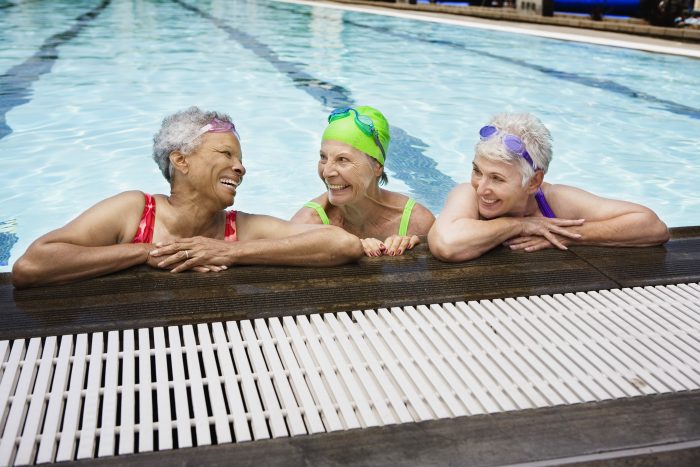Simple exercises can help
By David Dunaief, M.D.

We have had far more ice this winter than snow. Of particular concern is black ice, when a thin ice coating looks innocuously like a simple damp surface. This phenomenon has increased our risk for falling and injuring ourselves. I’ve received quite a few calls this winter from friends and patients who have taken tumbles resulting in broken bones and torn ligaments.
Even without icy steps and walkways, falls can be serious for older patients, where the consequences can be devastating. They can include brain injuries, hip fractures, a decrease in functional ability and a decline in physical and social activities (1). Ultimately, a fall can lead to loss of independence (2).
What increases fall risk?
There are many factors. A personal history of falling in the recent past is the most prevalent. However, there are other significant factors, such as age and medication use. Some medications, like antihypertensive medications, which are used to treat high blood pressure, and psychotropic medications, which are used to treat anxiety, depression and insomnia, are of particular concern. Chronic diseases can also contribute. Circumstances that predispose us to falls also involve weakness in upper and lower body strength, decreased vision, hearing disorders and psychological issues, such as anxiety and depression (3).
Simple ways to reduce fall risk
It is most important to exercise. We mean exercises involving balance, strength, movement, flexibility and endurance, all of which play significant roles in fall prevention (4). The good news is that many of these can be done inside with no equipment or with items found around the home. We will look more closely at the research.
Nonslip shoes are crucial indoors, and footwear that prevents sliding on winter ice, such as slip-on ice cleats that fit over your shoes, is a must. In the home, inexpensive changes, like securing area rugs, removing other tripping hazards, and adding motion-activated nightlights can also make a big difference.
Does your medication put you at risk?
There are several medications that heighten fall risk. Psychotropic drugs top the list, but what other drugs might have an impact?
A well-designed study showed an increase in fall risk in those who were taking high blood pressure medication (5). Those on moderate doses of blood pressure medication had the greatest risk of serious injuries from falls, a 40 percent increase.
These medications can reduce significantly the risks of cardiovascular disease and events, so physicians need to consider the risk-benefit ratio in older patients before stopping a medication. We also should consider whether lifestyle modifications, which play a significant role in treating this disease, can be substituted for medication (6).
The value of exercise
A meta-analysis showed that exercise significantly reduced the risk of a fall (7). It led to a 37 percent reduction in falls that resulted in injury and a 30 percent reduction in falls requiring medical attention. Even more impressive was a 61 percent reduction in fracture risk.
Remember, the lower the fracture risk, the more likely you are to remain physically independent. The author summarized that exercise not only helps to prevent falls but also fall injuries.
Unfortunately, those who have fallen before, even without injury, often develop a fear that causes them to limit their activities. This leads to a dangerous cycle of reduced balance and increased gait disorders, ultimately resulting in an increased fall risk (8).
What types of exercise are best?
Any consistent exercise program that improves balance, flexibility, and muscle tone and includes core strengthening can help improve your balance. Among those that have been studied, tai chi, yoga and aquatic exercise have all been shown to have benefits in preventing falls and injuries from falls.
A randomized controlled trial showed that those who did an aquatic exercise program had a significant improvement in the risk of falls (9). The aim of the aquatic exercise was to improve balance, strength and mobility. Results showed a reduction in the overall number of falls and a 44 percent decline in the number of exercising patients who fell during the six-month trial, with no change in the control group.
If you don’t have a pool available, tai chi, which requires no equipment, was also shown to reduce both fall risk and fear of falling in older adults (10).
Another pilot study used modified chair yoga classes with a small assisted living population (11). Participants were those over 65 who had experienced a recent fall and had a resulting fear of falling. While the intention was to assess exercise safety, researchers found that participants had less reliance on assistive devices and three of the 16 participants were able to eliminate their use of mobility assistance devices.
Our best line of defense against fall risk is prevention with exercise and reducing slipping opportunities. Should you stop medications? Not necessarily. If you are 65 and older, or if you have arthritis and are at least 45 years old, it may mean reviewing your medication list with your doctor. Before you consider changing your blood pressure medications, review your risk-to-benefit ratio with your physician.
References:
(1) MMWR. 2014; 63(17):379-383. (2) J Gerontol A Biol Sci Med Sci. 1998;53(2):M112. (3) JAMA. 1995;273(17):1348. (4) Cochrane Database Syst Rev. 2012;9:CD007146. (5) JAMA Intern Med. 2014 Apr;174(4):588-595. (6) JAMA Intern Med. 2014;174(4):577-587. (7) BMJ. 2013;347:f6234. (8) Age Ageing. 1997 May;26(3):189-193. (9) Menopause. 2013;20(10):1012-1019. (10) Mater Sociomed. 2018 Mar; 30(1): 38–42. (11) Int J Yoga. 2012 Jul-Dec; 5(2): 146–150.
Dr. David Dunaief is a speaker, author and local lifestyle medicine physician focusing on the integration of medicine, nutrition, fitness and stress management. For further information, visit www.medicalcompassmd.com or consult your personal physician.





